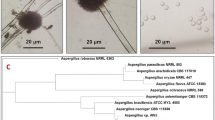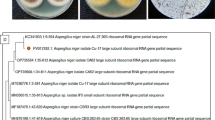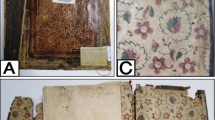Abstract
IT was shown in a previous paper1 that lower fatty acids in molasses inhibit in their undissociated form the germination of Aspergillus niger spores. It is therefore not possible in the production of citric acid by fermentation of sugars from beet molasses to start with an acid substrate, as is usual in synthetic media ; the acids present, already at pH nearing 4.8, inhibit spore germination. Acetic acid shows the greatest differences in effect when changing from a neutral to an acid medium.
This is a preview of subscription content, access via your institution
Access options
Subscribe to this journal
Receive 51 print issues and online access
$199.00 per year
only $3.90 per issue
Buy this article
- Purchase on SpringerLink
- Instant access to full article PDF
Prices may be subject to local taxes which are calculated during checkout
Similar content being viewed by others
References
Fencl, Z., and Leopold, J., Coll. Czech. Chem. Comm., 21, 1028 (1956).
Samson, F. E., Katz, A. M., and Harris, D. L., Arch. Biochem. Biophys., 54, 406 (1955).
Author information
Authors and Affiliations
Rights and permissions
About this article
Cite this article
FENCL, Z., LEOPOLD, J. Mechanism of Inhibition by Acetic Acid of the Germination of Spores of Aspergillus niger . Nature 179, 922 (1957). https://doi.org/10.1038/179922a0
Issue date:
DOI: https://doi.org/10.1038/179922a0
This article is cited by
-
Vergleichende Untersuchungen zur Biogenese fl�chtiger Produkte des Sekund�rstoffwechsels
Archiv f�r Mikrobiologie (1968)
-
Problémy permeability buněk
Československá Mikrobiologie (1958)



